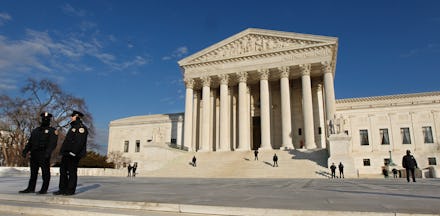Could Donald Trump overturn 'Roe v. Wade'? Here's what would have to happen

It's been only four days since Donald Trump became the new president of the United States, and he already reinstated restrictive measures on reproductive rights such as the Mexico City policy, which bars international non-governmental organizations that promote or perform abortions from receiving U.S. federal money. After such a controversial move, the following question looms large: Can Donald Trump eliminate Roe v. Wade, the landmark Supreme Court decision that grants women the federal right to get abortions legally?
As this year marks the 44th anniversary of Roe v. Wade, many of its supporters fear the decision will die at the hands of Trump, given that he's promised to appoint Supreme Court justices who are "pro-life" while being surrounded by anti-abortion figures in his administration.
Can Roe v. Wade be overturned?
Despite Trump's promises, overturning Roe v. Wade is not as easy as it sounds. It's a decades-long decision that receives the protection of the Constitution under the 14th Amendment, and it is widely accepted among the American public. A recent Pew Research poll, published on Jan. 3, shows that 69% of Americans believe the decision should not be overturned, compared to the 28% of Americans who think Roe v. Wade should be eliminated.
"Were Roe ever to be overturned, it could have ripple effects beyond the right to an abortion," a report by the National Women's Law Center states. "As privacy cases have recognized, 'our laws and tradition afford constitutional protection to personal decisions relating,' among other things, 'to marriage, procreation, contraception, family relationships, child rearing' and intimacy. The right to privacy, strengthened by Roe, supports each of these areas."
The report goes on to say that, "Overturning Roe could thus potentially erode the ability of individuals to make highly personal decisions free from intrusive government regulations and harm the overall right to privacy."
Which states stand to lose out?
Despite the existence of Roe v. Wade, states such as Ohio and Texas have already implemented laws that limit access to abortion, even though the Supreme Court ruled last year in Whole Woman's Health v. Hellerstedt that states cannot put restrictions on abortion practices unless a medical rationale exists.
A recent report by the Center for Reproductive Rights found that 33 states, plus the District of Columbia, are at risk to outlaw abortion if Roe v. Wade is overturned. The report indicates the following:
"Twenty-two states — nearly all of which are situated in the central and southern part of the country —could immediately ban abortion outright, whereas women in an additional 11 states (plus the District of Columbia) at risk of losing their right to abortion. In the remaining 17 states—which are primarily situated on the coasts of the country — a woman's right to abortion is secure based on current state law."
According to NBC News, four states — Louisiana, Mississippi, North Dakota and South Dakota — have readied laws that would automatically make abortion illegal if Roe v. Wade were to be eliminated.